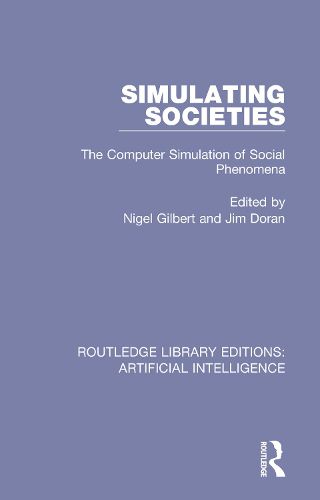Readings Newsletter
Become a Readings Member to make your shopping experience even easier.
Sign in or sign up for free!
You’re not far away from qualifying for FREE standard shipping within Australia
You’ve qualified for FREE standard shipping within Australia
The cart is loading…






The most exciting and productive areas of academic inquiry are often where the interests of two disciplines meet. This is certainly the case for the subject of this book, originally published in 1994, which explores the contribution that computer-based modelling and artificial intelligence can make to understanding fundamental issues in social science.
Simulating Societies shows how computer simulations can help to clarify theoretical approaches, contribute to the evaluation of alternative theories, and illuminate one of the major issues of the social sciences: how social phenomena can emerge from individual action. The authors discuss how simulation models can be constructed using recently developed artificial intelligence techniques and they consider the methodological issues involved in using such models for theory development, testing and experiment. The introductory chapters situate the book within social science, and suggest why the time was ripe for significant progress, before defining basic terminology, showing how simulation has been used to theorize about organizations, and indicating through examples some of the fundamental issues involved in simulation. The main body of the text provides case studies drawn from economics, anthropology, archaeology, planning, social psychology and sociology.
The appeal of this path-breaking book was twofold. It offered an essential introduction to simulation for social scientists and it provided case study applications for computer scientists interested in the latest advances in the burgeoning area of distributed artificial intelligence (DAI) at the time.
$9.00 standard shipping within Australia
FREE standard shipping within Australia for orders over $100.00
Express & International shipping calculated at checkout
The most exciting and productive areas of academic inquiry are often where the interests of two disciplines meet. This is certainly the case for the subject of this book, originally published in 1994, which explores the contribution that computer-based modelling and artificial intelligence can make to understanding fundamental issues in social science.
Simulating Societies shows how computer simulations can help to clarify theoretical approaches, contribute to the evaluation of alternative theories, and illuminate one of the major issues of the social sciences: how social phenomena can emerge from individual action. The authors discuss how simulation models can be constructed using recently developed artificial intelligence techniques and they consider the methodological issues involved in using such models for theory development, testing and experiment. The introductory chapters situate the book within social science, and suggest why the time was ripe for significant progress, before defining basic terminology, showing how simulation has been used to theorize about organizations, and indicating through examples some of the fundamental issues involved in simulation. The main body of the text provides case studies drawn from economics, anthropology, archaeology, planning, social psychology and sociology.
The appeal of this path-breaking book was twofold. It offered an essential introduction to simulation for social scientists and it provided case study applications for computer scientists interested in the latest advances in the burgeoning area of distributed artificial intelligence (DAI) at the time.